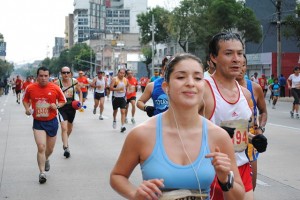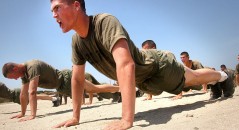 Running is a great way to get fit, lose weight and have fun. For some, taking their running to another level involves races or even marathons. If this sounds like you, without proper pre-race running nutrition, your body won’t have the fuel to compete!
Running is a great way to get fit, lose weight and have fun. For some, taking their running to another level involves races or even marathons. If this sounds like you, without proper pre-race running nutrition, your body won’t have the fuel to compete!
While putting in hours of training is important, nothing can replace a healthy diet to help your muscles reload and keep your fitness at top levels. By following some simple tips for what to eat leading up to your big run, you can be sure that you’ve done everything possible for a great race.
Pre-run power up!
Long-distance running requires energy that will maintain steady blood sugar levels throughout the run. It’s recommended to “top up” glycogen levels with a pre-race meal about two to four hours beforehand.
For every pound of body weight, eat a range of 0.5 to 1 gram of carbohydrates. The longer you have before the race, the better it is to eat the higher end of the range. For example, if you’re 3 hours from the start, aim more for .75 grams per pound of body weight.
The pre-race meal should be lower in fats and protein, too, since digestion takes longer. A recent study researched the effects of extra carbohydrates on marathon times of novice runners. They found that runners who ate a more substantial amount of pre-race carbs finished with faster times.
Long distance nutrition needs
As you might expect, when a runner is training for longer distances, calorie and carbohydrate needs increase. For recovery and running fuel, high amounts of carbs will reload the muscles with glycogen.
“Glycogen forms an energy reserve that can be quickly mobilized to meet a sudden need for glucose.” This means the body can quickly convert extra carbs to energy and give a big boost to a long-distance runner.
Generally speaking, while training for long distance runs, between 7 and 10 grams of carbohydrates per kilogram of body weight is a good goal. Before very long training runs, intake needs to be at the upper end of the 7 to 10 g spectrum.
Over the course of a training regimen for long distance runs, a minimum of 55% carbohydrate intake should be maintained. Increasing the percentage to 60 or 65% before longer training runs will provide the boost to keep going.
One important component of running nutrition that is often overlooked is the need for antioxidants. Free radicals increase with vigorous exercise, which includes distance running. Eating foods high in antioxidants increases the body’s natural defenses and helps reduce free radicals and potential damage.
While everyone should eat several servings of antioxidant-laden fruits and vegetables, runners need a minimum of 7-8 daily servings. Loading up on fruits and veggies also bumps up the mineral and vitamin needs of runners.
Regardless of if you are new to running or an experienced distance racer, quality nutrition during training and before a race are essential for peak performance. By giving your body the energy it needs, you can cross that finish line faster than expected!
Photo Credit: “XXIX Maratón Internacional de la Ciudad de México – 3” by Carlos Solís




